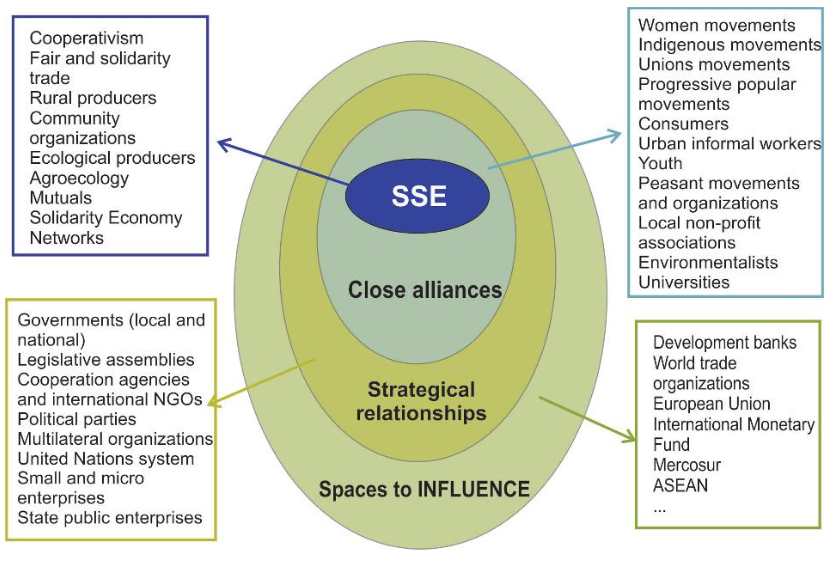The Social Solidarity Economy is already happening through many thousands of citizens’ initiatives, solidarity practices and collaborative networks all over the world. These practices involve all sectors of the economy: production, finance, distribution, exchange, consumption, regeneration and governance. But they are not necessarily all monetary forms of exchange.
Collective ownership and management structures
Self-management and collective ownership in the workplace and in the community is central to the solidarity economy. Different terms are used throughout the world to refer to collective ownership and management structures. In some parts of Africa and Eastern Europe, for example, the term cooperatives is avoided due to negative historical connotations. There are many different expressions of self-management and collective ownership including: cooperatives (worker, producer, consumer, credit unions, housing, etc.), collective social enterprises, and participatory governance of the commons (for example, community management of water, fisheries, or forests).
Legal recognition of these cooperative, collaborative and participatory practices is not a requirement for inclusion as part of the SSE.
Social movements
Historic social movements that are fighting for social and economic justice such as the women’s labor, land reform, small-scale farmers, homeless, poor people’s, indigenous, and environmental movements are core to the evolution of solidarity economy, as “an open process, an invitation” to join forces as a movement of movements “continually seeking connections and possibilities while holding on to the transformative commitment of shared values”.
This movement of movements, which is an active part of the “Other world is possible”- the World Social Forum – and crosses roads with many other “alter-economic” and social justice movements, has common traits.
New social movements, based on youth activism, a return to the Commons on new grounds (rural, urban and digital commons), a renewed ecofeminist approach, as well as degrowth, transition towns, climate justice and the more genuine forms of sharing economy are growing closer, as they meet in convergence spaces and form alliances.
Municipalist pro-SSE public institutions networks have begun to link together in several countries, in a collaborative mode with the SSE actors. And recent framework laws have started to legally recognize SSE in different parts of the world.
Non-monetized exchanges
Non-monetized work and exchanges are important parts of SSE, in as far as labor is honored and valued, whether it is paid or not, because it creates a shared wealth to the community and provides the worker with satisfaction, happiness, and social recognition. Similarly, the use of social and complementary currencies is an important tool to promote a local economic circuit and maintaining the value in the territory.
Gift economy is gaining also more recognition, as it is an essential part of the healthy life of a community.
SSE, Social Movements and Institutional Actors

Note: the categories represented in the above figure should not be understood as rigid ones. In many cases, groups and sectors could be either defined as being part of SSE, or better fit in the close alliances section. Sharing and endorsing the vision and values of SSE and abiding by the democratic practices it puts forth is key to determine where does a group stand in regard to SSE. (source: RIPESS-LAC, RIPESS Latin America and the Caribbean)
Potential to build alliances and mutually supportive collaborations with (Extract of the Global Vision):
- The popular or informal sector of the economy is very important given that many people, particularly in the global South, depend on it for their livelihoods. For example, three-quarters of the population in Mali are involved in the informal economy. The popular economy is comprised of economic activities that are not covered by formal arrangements such as taxation, labor protections, minimum wage regulations, unemployment benefits, or documentation. Many self-employed workers, micro-enterprises, traders, and mutual aid practices are part of the popular economy. The popular economy is not the same as the solidarity economy, but is aligned in many ways because the actors often find collective ways to provide for social and economic needs, such as lending circles, community kitchens (comedores populares), mutual aid, mutual insurance systems and so forth.
- Organic, green, fair trade there are many trends and movements that reflect solidarity economy values and yet may or may not be included in the solidarity economy. An example of the latter would be Wal-Mart, which has its own brand of Rainforest Certified Fair Trade Coffee but at the same time engages in union busting and uses its massive market share to depress prices and wages. Yet there are certainly practitioners in these sectors that are valuable allies and others that are already part of the social solidarity economy.
- Consumer practices SSE values consumer practices as an important tool to transform the system of production. These include forms of collectively organized consumption such as consumer co-operatives, solidarity purchasing groups, collective kitchens and some forms of the sharing economy as well as ethical consumption and voluntary simplicity.



